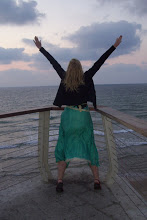"Tralfamadorians don't see human beings as two-legged creatures, either. They see them as great millipedes--'with babies' legs at one end and old people's legs at the other,' says Billy Pilgrim."
~ Kurt Vonnegut, Slaughterhouse-Five
The Middle East has been on fire since January, and in Arabic and English I follow as much of the news as I can. This minute-by-minute historical vigilance has catalyzed a personal obsession over my place in history. Is history mine? And if so, how much can I claim?
I was born in August of 1990--five days after Iraq invaded Kuwait to begin the First Gulf War, weeks before East and West Germany announced plans to reunite, and about a month before the collapse of the Soviet Union. This history, then, is my history; it forms the background of my life whether I notice it or not. But what I believe to be my history runs deeper than that; as a blonde, blue-eyed, American, Caucasian female I note iterations of myself not only in the early days of my country but further back, in early Britain, Germany, and Scotland. With no definite basis for connection I buy into the western European literary, historical, scientific, and political experience, inexplicably seeing my reflection in the ancient participants' faces.
This bothers me because there should be no difference between whether something happened 150 years or one hour before my birth. All that went before should be lumped into that which, for me, was not. When I am born I am without history, tabula rasa; there is just me and my timeline, which begins when my mind starts writing it down. This is what I'd like to believe. But disavowing any connection to a larger (hi)story is disproved by the cross-cultural and age-irrelevant existence of so much angsty literature about roots. For some reason it truly-madly-deeply matters where one comes from, from which combination of personal/domestic/foreign events one was produced. And in this respect I'm beginning to give Jung's collective unconscious more credence. Maybe people need a concrete connection to something totally outside themselves, but which resembles them--something grander and more perfect, but not perfect in the flawless sense, perfect in the verb tense sense, in that it has already happened. Paradoxically, this collective framework is essential to individuation. So I will learn and build and die in Vonnegut's infinite stream of millipede legs.
Further Reading: A Man Without a Country, Kurt Vonnegut
"Practically nobody on Earth is an American."
~ Kurt Vonnegut, Slaughterhouse-Five
The Middle East has been on fire since January, and in Arabic and English I follow as much of the news as I can. This minute-by-minute historical vigilance has catalyzed a personal obsession over my place in history. Is history mine? And if so, how much can I claim?
I was born in August of 1990--five days after Iraq invaded Kuwait to begin the First Gulf War, weeks before East and West Germany announced plans to reunite, and about a month before the collapse of the Soviet Union. This history, then, is my history; it forms the background of my life whether I notice it or not. But what I believe to be my history runs deeper than that; as a blonde, blue-eyed, American, Caucasian female I note iterations of myself not only in the early days of my country but further back, in early Britain, Germany, and Scotland. With no definite basis for connection I buy into the western European literary, historical, scientific, and political experience, inexplicably seeing my reflection in the ancient participants' faces.
This bothers me because there should be no difference between whether something happened 150 years or one hour before my birth. All that went before should be lumped into that which, for me, was not. When I am born I am without history, tabula rasa; there is just me and my timeline, which begins when my mind starts writing it down. This is what I'd like to believe. But disavowing any connection to a larger (hi)story is disproved by the cross-cultural and age-irrelevant existence of so much angsty literature about roots. For some reason it truly-madly-deeply matters where one comes from, from which combination of personal/domestic/foreign events one was produced. And in this respect I'm beginning to give Jung's collective unconscious more credence. Maybe people need a concrete connection to something totally outside themselves, but which resembles them--something grander and more perfect, but not perfect in the flawless sense, perfect in the verb tense sense, in that it has already happened. Paradoxically, this collective framework is essential to individuation. So I will learn and build and die in Vonnegut's infinite stream of millipede legs.
Further Reading: A Man Without a Country, Kurt Vonnegut
"Practically nobody on Earth is an American."


No comments:
Post a Comment